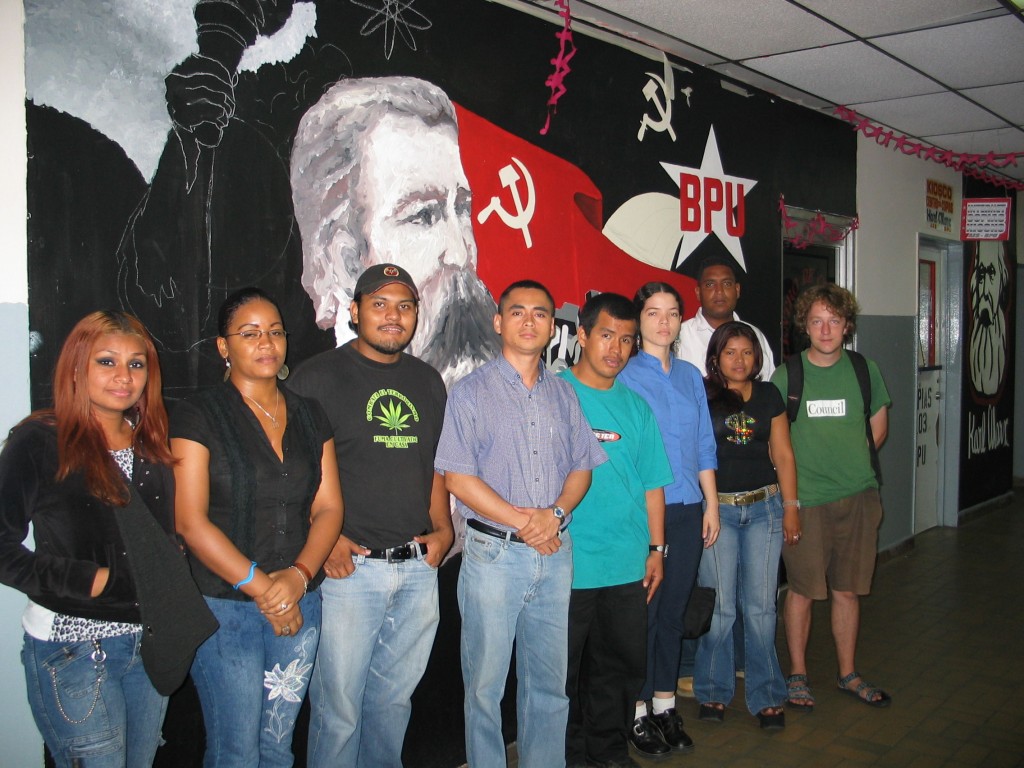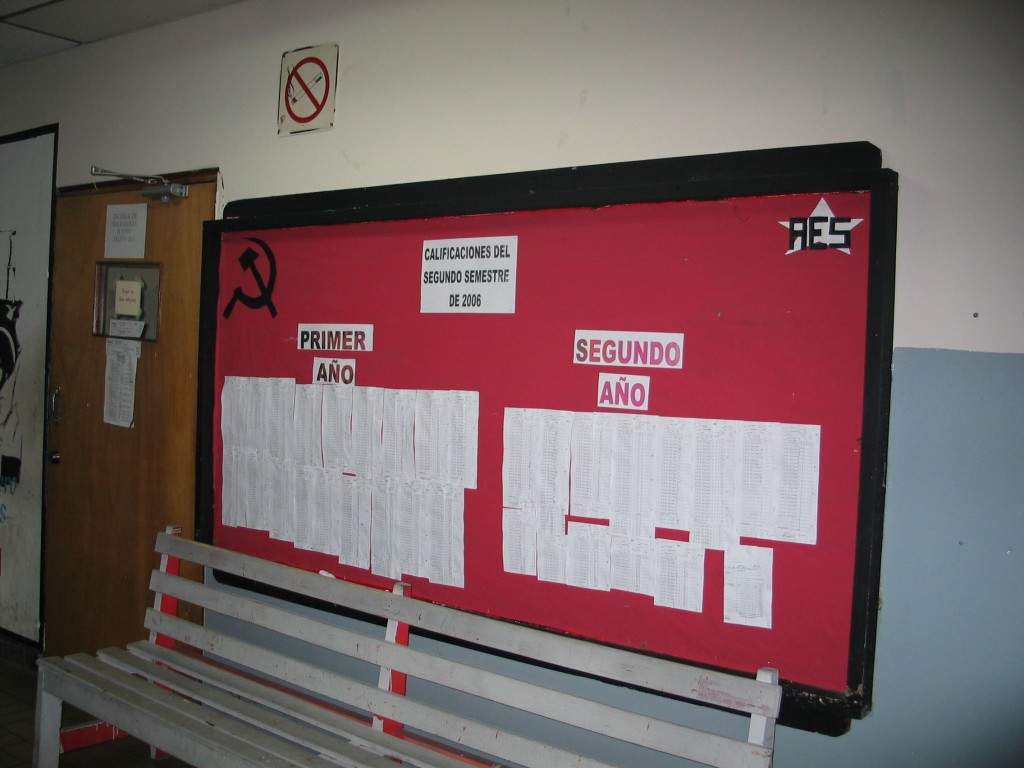Panama is my last destination before heading back to Douglas and from there to Europe. Although I have not had time enough to really get to know a lot of Central America, I guess it is time to go and get rid of my two backpacks — at least for a while.
The experience I want to share from Panama is for the first time more travel than politics related. I have experienced the same sort of things in other places, and I talking to some not so political friends and family, I know that it is somewhat out of the ordinary.
So here we go: Almost anywhere on the planet you as an activist might go, there is always and everywhere some kind of activist “community” that not only invites you and shows you around, but also one that has a number of reference points very similar to those you have yourself. Because of that, it is quite hard for me to say something like “the Panamanians are so and so” or “I really liked the warm culture of people in country X” — simply because I know that there are people with a world view quite similar to that which I hold, which generally puts them, but also me, at the fringes of society. Obviously, there are some exceptions — such as Douglas and most other areas far away from capitals and organized left wing politics. But those are very seldom regions that I see anything of anyway.

My example from Panama was when I sat in an Internet cafe on the university campus the other day. While checking my email, I heard the word “reformismo” being said by two guys sitting next to me. Now for the 99% of non-activists in this world, or activists of some kind of bourgeoisie save-the-planet-by-sorting-your-trash type, this word would probably been overheard. But for an activists operating within the ideological framework of radical socialist it is one of maybe 20-100 keywords that trigger one’s attention. A “reformist” is a person who is usually naive or bought off, who has not “realized” that “the system” can not be reformed and has to be replaced completely. The fact that all radicals at the same time claim to support any kind of reform for the better (but that in the long run it simply will not be enough) does not make reformists any better.
Anyway, so I heard the word “reformismo” — so what did I do? Like always, that was a conversation starter. So I did: “Are you guys some kind of socialists?” 5 seconds of odd faces later, I made it clear that I was and after an initial chat of about 5-7 minutes on where exactly to place me in the jungle of socialist organizations, the two Leninists started calling around using their cell phones to have a special meeting at the sociology faculty — whose student council is controlled by them. For maybe 90 minutes I had to give an overview of the situation of European revolutionary politics, and they gave me a rather substantial overview of the situation of the radical left in Panama. Although Panama was invaded by the United States and up to 7000 people killed in 1989, the great majority is still “pro-Yankee” and only 20% (I did not note the exact figure) are genuinely “anti-imperialist.” Although their group holds control over the faculty of sociology, they have a problem of keeping members after graduation, because they do not like the idea of having to “go to work” and rather want to work in easier jobs that their education makes available to them.
![About right wing studnets at their faculty: "They might want to remove these [pictures], but there is nothing they can do about it."](http://www.johanneswilm.org/wp-content/uploads/2012/03/20070208-karl_marx-1024x768.jpg)
And also, the entire left is not agreeing on the idea of having to involve itself in social struggles — “the Stalinists have this idea of first gaining national independence through an anti-imperialist movement, and then to fight the social struggle some time in the far away future,” one of the oldest said. Another topic that was touched was feminism — “there is a lot of machismo […] but the real problem is the capitalist mode of production, which lends itself to creating machismo,” as one of the two guys who spoke 80% of the time said. All those things are very similar to what I have heard a lot of times in Europe, and it just shows you in what way the local left is fractioned into various groups. Of course, there are always a few “local topics” — in this case the question of enlarging the canal, the social problems in the city of Colon and the status of the indigenous groups rights in the far wets and east of the country. But also these can usually be explained within the same radical framework, and the information can therefore be transferred without “cultural problems.” The left had struggled against the enlargement of the canal (which is about necessary because international ships have been constructed larger recently), very basically because the 6 Billion USD that will go into it will come from the general Panamanian population, while the “fruits” of it will be harvested by the multinational companies that can put their ships through and a small number of ultra rich Panamanians — touching the field of both anti-imperialism and the social question. In the question of Colon, a city inhabited by many of the descendants of the canal diggers from Haiti and other foreign countries live, it was important to stress the “exploitation” and not to try to give credit to “racial theories” on why people there are poor today. For the indigenous it is very much a struggle to develop a class consciousness among them as well.
Although the general activist level on the Panamanian left has been low since the end of the dictatorship, during which especially radical university politics had been one of very few political scenes of debate. But due to the privatizations of just about everything except water in the 1990s, they believed that an upcoming financial crisis (also helped on by the signing in of Panama into a free trade agreement with the US this first of January) would also lead to a social crisis, which again could give hope for an increase in anti-imperialist consciousness, they concluded.

And it went on like that for a 90 minutes….
Afterwards, we had a small photo session, as also they want to show on their web page that they had a comrade from Norway visiting.
Now here is where I wonder: Does it feel anything similar to travel around the would as a Jehovah’s Witness or a Mormon or something like that? Everywhere you go, you can find “your people,” up to the point where the cultural relativism of others completely looses it’s meaning?
For anyone who has not tried it I can only say: do it. If you do not feel you can sign up to a leftist ideology, become a religious fanatic of a religion with people everywhere. You will not ever be able to be a “foreigner” again — anywhere!

hey- that was raally insightful of you to realize that about Jehovah’s people we are truly an international brotherhodd regardless of what county or land we live in- we are all united by our beliefs and worship of Jehovah God- and ironically like you are convinced only a new system will ever bring true change for al of mankind- GOds KIngdom Government – not mans is our only hope-
I`m the webmaster of this organization
http://www.bpu.2ya.com
some infomation about BPU